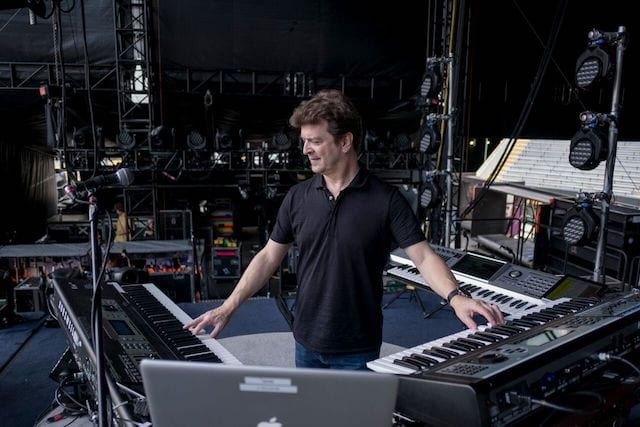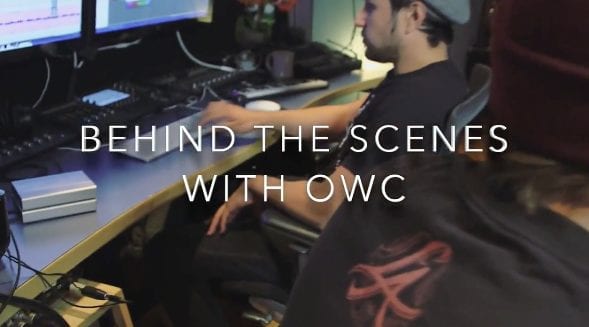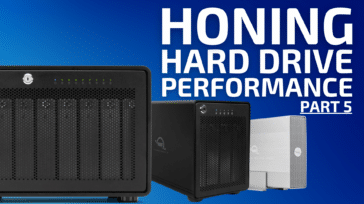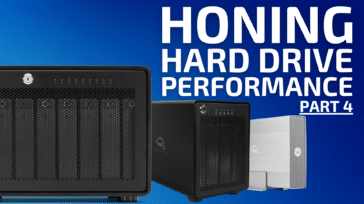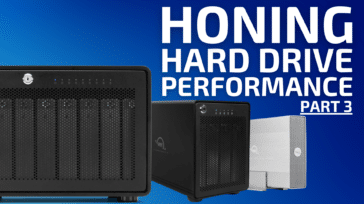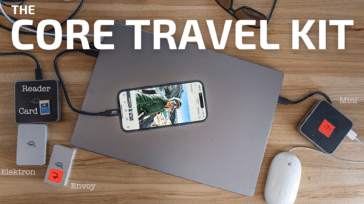Justin Perkins is comfortable on stage with a bass guitar in hand. But he might be even more comfortable at home in his audio laboratory, Mystery Room Mastering, where he masters records as well as performing audio mixing and production, and post-production on video and film. Recently, Perkins has mixed and mastered for former “The Replacements” guitarist Tommy Stinson’s current band “Bash & Pop”, and even played bass on the band’s tour.
Ahead of NAMM 2019, which will bring together musicians from around the world, OWC caught up with Perkins to talk about his history in the industry as well as his heavy reliance on OWC gear in the studio. And if you’re planning to attend NAMM 2019, be sure to stop by and visit OWC at booth 11802.
Rocket Yard: How did you get your start in Music industry?
Justin Perkins: It was a slow progression. I started doing music for fun in middle school with my friends. Back then, in the 90s, recording studios were more expensive than they are now. We had no business being in one, so we started recording our own stuff on a cassette 8-track. And other bands started to hear the recordings and said: “can you record our band?” It was a combination of recording our own band and other bands, and it just kind of snowballed. I was doing this in my dad’s basement… And then I graduated to a more official recording studio.
When I was leaving Smart Studios [in Green Bay], I would freelance at different studios. If someone wanted to do a project, I would pick out the best studio for that project … and that’s when I started expanding my home set-up for mixing. That’s when Pro Tools became more accessible to be at home. You would go to the studio and record and do the big stuff and then you would bring it home and do editing and even some mixing as computers became more powerful. The budgets weren’t there for big studios anymore.
Eventually, people started asking more and more about mastering and I really started to study the process and get serious about it.
RY: What are the differences between a mastering engineer and a recording engineer?
JP: At Smart Studios, I was basically mixing and recording bands. And that process is basically just recording the takes and making sure you got the best performances. And when you get into mixing, that’s more of adjusting the levels of instruments. You want the guitars to be this loud and the vocals to be this loud or have certain effects. By the time the mixing is done, you should be happy with how it sounds. In mastering… you fix problems but ideally, you love it before it goes to mastering. With mixing you’re working with many tracks… everything is very flexible and you can still do a lot of alterations. In mastering … you can’t say “I want the vocals to be louder.” It’s really not a place to correct one particular thing. It’s more of a global approach.
RY: Do you have any advice for mastering engineers getting started?
JP: There really are no shortcuts. You can go to school. You can have the best equipment. But people need to want to work with you. You have to take the time to develop your skill and it doesn’t happen overnight. You gotta train your ear to know what people are going to like. You gotta adapt to trends, even though your taste might change over ten years. You have to always be learning and it’s a slow process to get to a point to where you can support yourself and make a living at it. It’s a very word-of-mouth industry… people don’t hire you because you went to this school or have this piece of equipment. They hire you because they heard something that you did and they liked the sound. Even then, they have to enjoy working with you.
RY: We know you’re a big OWC fan, what’s the first piece of gear got from us?
JP: That would be the [Mercury Elite Pro] hard drive, back when they still had FireWire 400. After I worked in Green Bay, I worked in Madison, Wis. at Smart Studios. Instead of buying reels of tape, they would require bands to buy their own hard drive. Back then, hard drive space was not so affordable. It was kind of a serious cost. When I got [to Smart Studios], they were using OWC hard drives.. You could call at 5 in the evening and it’s there the next day, which was great.
RY: Aside from the quick turnaround, what other reasons do you work with OWC drives?
JP: [The drives are] very consistent. And that’s the beauty of it. You want it to work, but you shouldn’t have to think about it or fight with it and say “oh, this hard drives acting up”… it was just so robust and reliable. I would go on the website and see that it’s compatible with Pro Tools. Years ago, Pro Tools was very particular about the chipset in the hard drives that you used to store the audio, and OWC was always very progressive about making sure it’s compatible with Pro Tools and other professions, whether it be video editing or audio apps. I could tell it was very friendly to the creative art community and not just for storage, but actual performance and reliability.
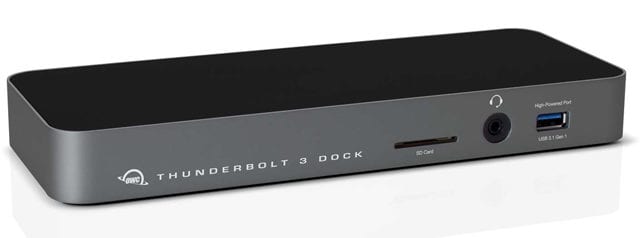
RY: I see right here you have an OWC Thunderbolt 2 Dock, but you’ve also upgraded to the OWC Thunderbolt 3 Dock. How did you implement the docks into your set up?
JP: A while back, I was using a tower Mac Pro that had PCIe slots, so I had a couple of audio cards in there. And I decided to go to an iMac …. [and the docks] became a really nice way to minimize my set up.
RY: Let’s get into storage. Give us a description of how you use OWC drives?
JP: When I’m working, I have solid state drives because they’re very fast over Thunderbolt. When I’m done with projects, I put it on the ThunderBay 4 mini. And I have an app that lets me catalog all my archives so I can search it, so if a certain artist or band emails me, I can search their name and I can find any files related to them in a matter of seconds. I keep the data cable hooked up and I just have to plug in the power and within seconds I have all my archives in front of me and I can find whatever I need. [The ThunderBay 4 minis] are perfect… they’re nice and small. I like the compact size, I have four terabytes and it’s very quiet. The fan is very minimal. That’s part of why I use solid state drives… there’s no noise at all.
RY: Lets talk about Mercury Elite Pro.
JP: I use that still for backups. I have more than one backup because you can never have too many. Once or twice a day, I plug that in. It’s bus-powered so there’s no messing with power cables. It’s so fast… I have an app that just scans for new changed files, so it doesn’t take long to backup. I don’t need to think about it. You set it up once, plug it in and wait for it to do its thing. [The Mercury Elite Pro] is also great for travel, which is originally how I started to use it.
RY: You have two of these [Envoy Pros]?
JP: Yeah, this one stays in my studio by the computer and every 15 minutes a backup will run. If there ever was a drive failure or if I made a mistake and corrupted a file, I would only lose 15 minutes of work. And what I like about it, again, is it’s bus-powered. It’s very discreet and it’s quiet. It makes no noise. I forget that it’s there. It’s so stable. And I have another one for traveling because if I do some work with my laptop on the road it’s not always feasible to upload the files to the cloud. If you’re at a hotel with poor internet, it could take a while. If you’re on the go, you don’t have time to sit there and upload it. At least you have a safety copy and you can put it in another bag. They feel very durable and I’ve had zero issues with them.
For more on Justin Perkins, visit mysteryroommastering.com.






